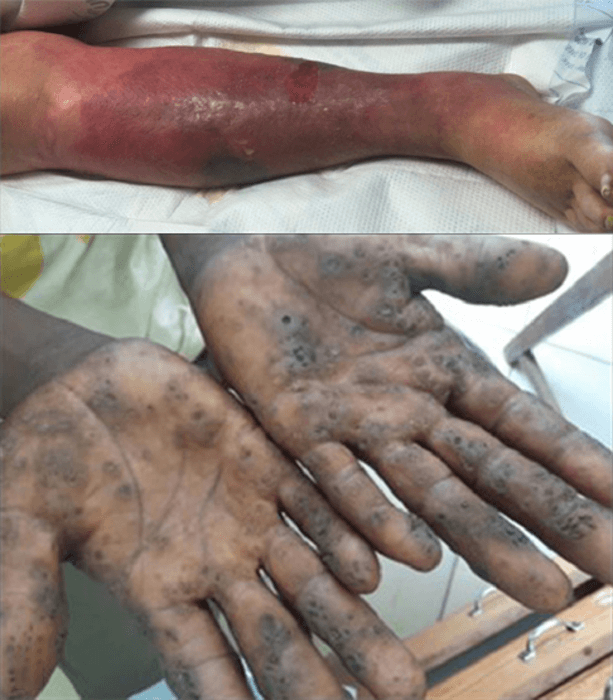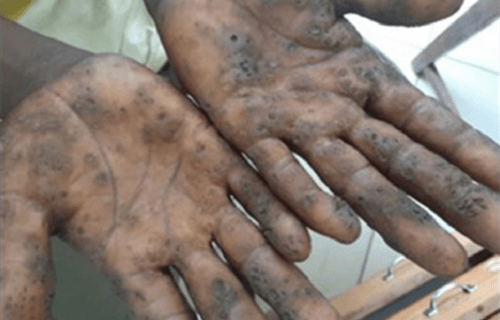NASHVILLE, Tenn. — Our skin is the first line of defense against the outside world. Now, a new study warns that this vital organ is facing severe danger from climate change. A team from Vanderbilt University says that the increase in extreme weather events raises the risk of developing various skin diseases.
Since many skin diseases are climate sensitive, natural disasters like floods, hurricanes, and severe heat waves can exacerbate minor problems many people deal with every year, according to the team.
“We wanted to provide dermatologists and other practitioners with a comprehensive overview of extreme weather-related skin disease as a foundation for patient education, implementation of early treatment interventions, and improved disease outcomes,” explains lead author Eva Rawlings Parker, MD, from the Department of Dermatology and the Center for Biomedical Ethics and Society at Vanderbilt University Medical Center, in a media release. “We were astounded by the shear breadth of impacts that extreme weather events have on skin disease and how profoundly climate change exacerbates inequality.”
“This information is especially timely in light of traumatic events such as Hurricane Ian, which has led to increased infections due to flood and standing water exposures,” adds Marcalee Alexander, MD, the Editor-in-Chief of The Journal of Climate Change and Health.

From floods to fires, our skin is constantly in danger
In the study, researchers examined nearly 200 articles documenting the various impacts of extreme weather on skin. From those reports, they found that flooding — one of the most common natural disasters — often contributes to traumatic wounds and bacterial and fungal infections. Flooding can also lead to contact dermatitis, since this water is often polluted with pesticides, sewage, fertilizers, and other harmful chemicals.
At the opposite end of the spectrum, study authors found that wildfire smoke can cause atopic dermatitis (eczema) — even among adults with no history of the skin condition. Smoke exposure can also cause acne to worsen, the team notes.
Even without fire, heat alone can damage human skin. Researchers explain that our skin plays a critical role in regulating body temperature. With that in mind, extreme heat waves prevent the skin from properly cooling down — increasing the risk of heat stroke and death. Several forms of chronic inflammatory dermatoses also get worse when temperatures rise.
During the summer months, it’s common for more people to be outdoors soaking up the sunshine. However, the Vanderbilt team says this exposes people to higher levels of air pollution, disease-carrying insects, and UV radiation — which can cause skin cancer.
Who faces the greatest risk from extreme weather?
Dr. Parker and the team discovered that extreme weather events are disproportionately affecting vulnerable and marginalized populations — causing an even greater disparity in public health. These communities often include children, pregnant women, senior citizens, minority neighborhoods, migrants, and low-income workers.
More specifically, the study found Black and Hispanic populations and low-income neighborhoods are more likely to live in areas where flooding is more common. Therefore, these communities also have a higher risk of developing various skin problems and have less access to care when they do.
The team notes that when the weather gets bad, people move. This is why skin diseases are one of the most common problems migrants deal with as they travel between states and nations.
“This year has been marked by historic and deadly heat waves in North America, Europe, and Asia; devastating flooding in the United States, Pakistan, and Australia; drought and famine in Somalia and Madagascar; and wildfires in the Western US, Russia, Argentina, and throughout Europe. Extreme weather events are ravaging the planet, disrupting critical infrastructure, severely impacting health and accentuating health disparities,” says Dr. Parker. “Clinicians, policymakers, environmental advocates and researchers across the globe should be acutely aware of the current and future disruptions that climate change and extreme weather events pose to human health.”
The findings appear in The Journal of Climate Change and Health.

